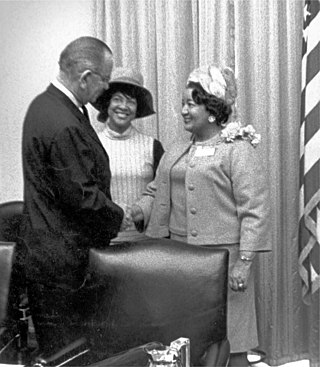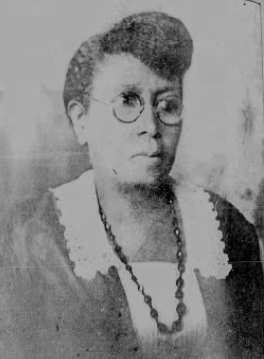
James Morris Lawson Jr. is an American activist and university professor. He was a leading theoretician and tactician of nonviolence within the Civil Rights Movement. During the 1960s, he served as a mentor to the Nashville Student Movement and the Student Nonviolent Coordinating Committee. He was expelled from Vanderbilt University for his civil rights activism in 1960, and later served as a pastor in Los Angeles for 25 years.

Alabama State University is a public historically black university in Montgomery, Alabama. Founded in 1867, during the Reconstruction era, it was one of about 180 "normal schools" established by state governments in the 19th century to train teachers for the rapidly growing public common schools. It was one of 23 established to train African Americans to teach in segregated schools. Some of the 180 closed but most steadily expanded their role and became state colleges in the early 20th century and state universities in the late 20th century. ASU is a member-school of the Thurgood Marshall College Fund.

The NAACP Legal Defense and Educational Fund, Inc. is an American civil rights organization and law firm based in New York City.
David Montgomery was a Farnam Professor of History at Yale University. Montgomery was considered one of the foremost academics specializing in United States labor history and wrote extensively on the subject. He is credited, along with David Brody and Herbert Gutman, with founding the field of "new labor history" in the U.S.
Black Workers' Struggle for Equality in Birmingham is a 2001 book written by David Montgomery, Professor of History Emeritus at Yale University, in collaboration with Horace Huntley of the Birmingham Civil Rights Institute. The book makes use of oral histories to explain the interactions between African-American workers and labor unions in the post-Civil War American South.

The 16th Street Baptist Church is a Baptist church in Birmingham, Alabama, United States. In 1963, the church was bombed by Ku Klux Klan members. The bombing killed four young girls in the midst of the Civil Rights Movement. The church is still in operation and is a central landmark in the Birmingham Civil Rights District. It was designated as a National Historic Landmark in 2006. Since 2008, it has also been on the UNESCO list of tentative World Heritage Sites.

The University of Alabama at Birmingham Marnix E. Heersink School of Medicine is a public medical school located in Birmingham, Alabama, United States with branch campuses in Huntsville, Montgomery, and at the University of Alabama College of Community Health Sciences in Tuscaloosa. Residency programs are also located in Selma, Huntsville and Montgomery. It is part of the University of Alabama at Birmingham (UAB).
David T. Beito is an American historian and professor emeritus of history at the University of Alabama.

Mildred D. Brown was an African-American journalist, newspaper baker, and leader in the Civil Rights Movement in Omaha, Nebraska. Part of the Great Migration, she came from Alabama via New York and Des Moines, IA. In Omaha, she and her husband founded and ran the Omaha Star, a newspaper of the African-American community.
Arthur Davis Shores was an American civil rights attorney who was considered Alabama's "drum major for justice".

Johnnie Rebecca Daniels Carr was a leader in the Civil Rights Movement in the United States from 1955 until her death.
Andrew Michael Manis is a historian, author, and professor at Middle Georgia State University in Macon, Georgia.
Bernard Lee was an activist and member of the Southern Christian Leadership Conference during the Civil Rights Movement. He was a key associate of Martin Luther King Jr.

Alexander Demitri "Alex" Shimkin was an American war correspondent who was killed in Vietnam. He is notable for his investigation of non-combatant casualties in Operation Speedy Express.
John Solomon Sandridge is an American painter, sculptor, illustrator, author, educator, inventor, entrepreneur and philanthropist. He is notably recognized as the first and only black artist licensed during the early 1990s by The Coca-Cola Company to incorporate African-American themes in their artwork, and being selected as a commissioned sculptor by the Olympic Soccer Committee during the 1996 Summer Olympic Games in Atlanta, Georgia.

Carrie A. Tuggle was an American educator, philanthropist, and social activist. After emancipation, she sought for equality in education, and the right to exercise voting rights in Birmingham, Alabama. She established Tuggle Institute, a local boarding school for black children who were destitute orphans and juvenile defendants, and were given free education. The Tuggle Institute functioned with support from the Order of Calanthe and the Knights and Ladies of Honour of Alabama.

Joseph W. Ellwanger Jr. is a Lutheran pastor, author, and civil rights activist. He was a key figure in the Civil Rights Movement in Birmingham, Alabama, and the only white religious leader included in strategy meetings with Martin Luther King Jr.
Monica Baskin is an American psychologist who is a professor of medicine at the University of Alabama at Birmingham. Her research considers health disparities in the Deep South. She serves as Director of Community Outreach and Engagement at the O'Neal Comprehensive Cancer Center.
Miriam DeCosta-Willis was an American educator, writer, and civil rights activist. The first African-American faculty member at Memphis State University, having previously been denied admission to the school as a graduate student due to her race, she spent her career as a professor of Romance languages and African-American studies at a variety of colleges in Memphis, Tennessee, and the Washington, D.C., area. She published more than a dozen books throughout her career, largely dealing with Afro-Latino literature and Black Memphis history.
Selwyn Maurice Vickers is an American gastrointestinal surgical oncologist. He is the President and CEO of Memorial Sloan Kettering Cancer Center, starting in September 2022. Previously, he was the senior vice president for Medicine and Dean of the University of Alabama at Birmingham School of Medicine and the CEO of both the UAB Health System and the UAB/Ascension St. Vincent's Alliance.









